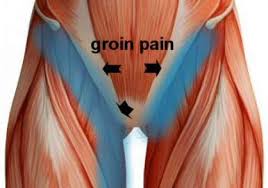What is a groin strain?
A groin strain is a tear or an injury to any of the adductor muscles found on the inner side of the thigh. Sudden movements such as kicking, twisting or jumping can certainly trigger an acute injury. When groin strain develops, the muscle is overstretched beyond its capabilities and the muscle tissue is torn.
While anyone can get a groin strain, athletes are most at risk. Usually these injuries are not too serious, but recovery from a severe strain can take a long time. You can also develop a groin strain from lifting heavy objects or simply from falling.

Grading Muscle Strains:
Grade 1 – is a mild strain where your muscles may be slightly torn but certainly overstretched
Grade 2 – is a moderate strain where you have a significant muscle tear
Grade 3 – a severe strain where most of your muscle or tendon is torn
What are the early signs and symptoms of a groin strain?
There are varying signs and symptoms of a groin strain and these depend on the degree of injury. A strain in the groin will result in pain, some weakness, how you change direction when walking, and the strength of your “kick” action. Symptoms include:
- Pain that is usually felt in the inner thigh
- Decreased strength in the upper leg
- Swelling to your upper leg
- Bruising to your upper leg
- Pain when weight-bearing
- Hearing a snapping sound at the moment of injury
How is a groin strain diagnosed?
Your doctor or physiotherapist will ask details about your injury and your medical history. Sometimes, groin pain can be referred from the back or the hip and therefore diagnosing this injury is challenging.
Your will then need a physical examination and possibly a referral for a scan, such as an MRI. Confirming this diagnosis will help determine how best to manage your condition.
How is a groin strain treated?
The treatment goal for groin strain is to reduce swelling and pain as quickly as possible. For the first few days after injury you should follow this protocol:
- Rest
- Ice
- Compression
- Elevation
- Anti-inflammatory medication
Your doctor may suggest some physiotherapy to help relieve your pain and symptoms and get you mobile again.
If it is found that you have a Grade 3 strain you may need surgery to repair the torn fibres.
What is the physiotherapy treatment for groin strain?
When you see your physiotherapist, they will assess your movement and mobility. The goal of your physiotherapist is to minimise the effects of immobilisation, regain full range of movement, and restore muscle strength, coordination, and endurance.
One the days after injury, you may be given crutches and anti-inflammatory medication. Once your pain is controlled, your physiotherapy will offer exercises, but only within your pain limit.
Applying heat or ice therapy to your injury can be really useful, especially when starting physiotherapy. As your rehab progresses throughout the coming weeks, mild pain can be allowed during physiotherapy but it should subside immediately after the exercises.
Once your full range of motion is accomplished, your rehabilitation will concentrate on specific strengthening exercises that aim for muscular recovery and endurance.
How long does it take to recover from a groin strain?
Recovery depends on the degree of the injury and there is no definitive time frame. Avoid any activities that cause you pain in that area and resume your activities gradually. There are so many factors to take into account, including your level of fitness before the injury. Every individual is different and recovery varies.
How physiotherapy can help
We will do whatever we can to get you on the fastest route to recovery. Physiotherapy is often required after a fracture has healed due to residual weakness and stiffness in the joint. Some of the treatment methods we use include:
- Mobilisation
- Strengthening exercises
- Myofascial trigger point release
- Pilates
- Cross-friction massage
- Stretching and range of movement exercises
- Acupuncture
- Functional exercises
- Kinesio-taping
